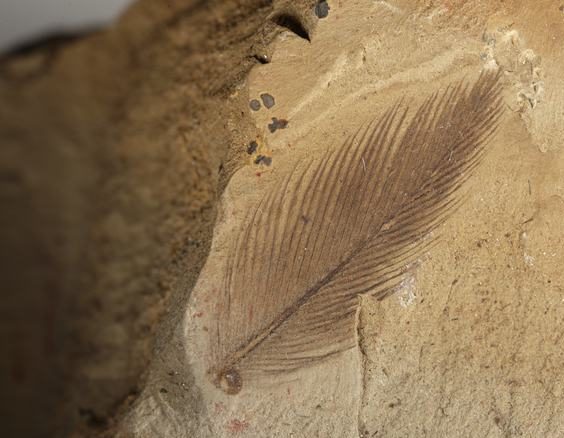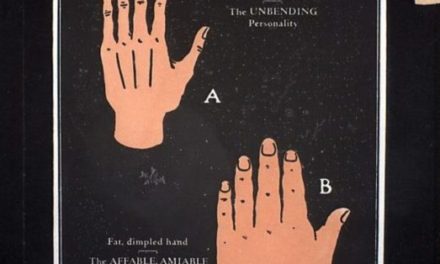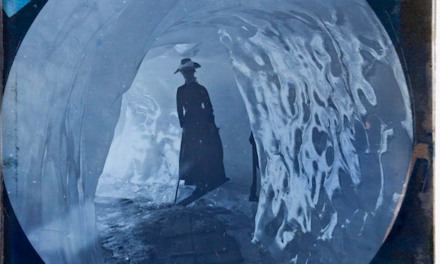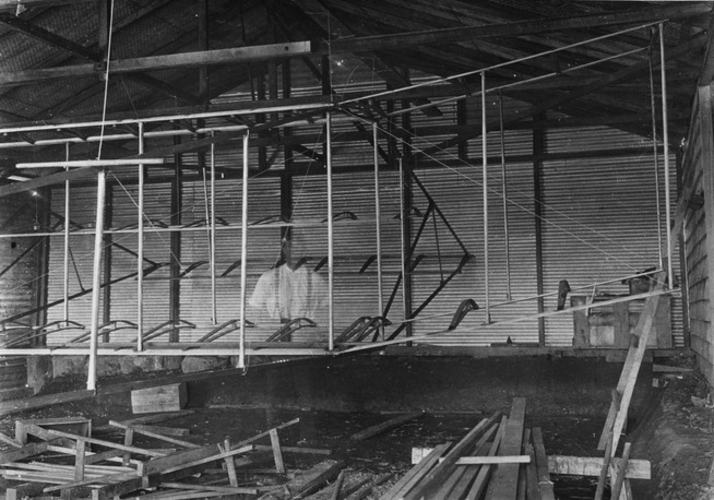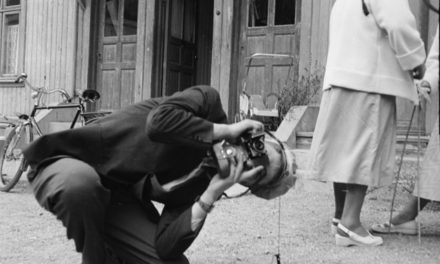Fossil feather, Benjamin Healley. Museums Victoria, Melbourne
Mountains Between
by Jeff Ewing
White flakes streaked diagonally across the road in front of Shelley, then swirled away in the wash from the Lincoln. She let herself believe it was snow, watched the impossible storm lift and dance on the heat waves rippling off the pavement. There was no harm in fooling yourself from time to time—in the valley, with nothing stretching off into nothing, it was an essential skill. One flake caught under her wiper and fluttered like a moth. She studied it for a moment, then turned the wipers on and watched it drift off into the irrigation ditch.
She’d seen the real thing only once, years ago when she was a girl. The snow falling so slowly, onto the schoolyard and along the field roads. People still talked about it, especially on days like today—ninety-six degrees at eight-thirty in the morning. The back of her blouse was already sticking to the seat.
She looked in the rearview mirror and saw the pink duck pacifier bobbing against Casey’s lips, his eyes moving faintly behind their almost transparent lids. They both needed that. On the seat beside her, the mutton-chopped face of Ibsen glowered up at her from a fat hardback she’d picked up for $2.50 at a library sale. It had been a revelation. Standing under the sun-bleached awning, the sidewalk radiating like a hotplate, she’d been able to leave the valley behind and look out on a cooler, kinder world:
A road along the seashore. An avenue of trees along the road. Between the trees are seen the fjord, high mountain ranges and peaks.
She willed that other road into being now, saw it overlaid like vellum on the cracked highway—the cool wall of trees cutting the light, the flicker of water and shade, the blue line of the far shore. Mountains loomed and the air conditioner whirred. The storm thickened around her.
She concentrated, fixing the landscape in her mind, but it began to waver as a sour, burnt smell seeped in through the vents. The source of the storm was just ahead of her, a battered flatbed loaded with double rows of cages. The truck bounced over a pothole, and set off a fresh flurry of feathers from the chickens piled inside, one on top of another. She eased up on the gas and let the truck pull away. She swallowed hard, felt the dryness starting in her throat. Nothing here was what it should be.
Her cell phone rang, and she snatched it up before it could wake Casey.
“Randy? You coming today?”
“Sorry. You have the wrong number.”
“Who is this?”
“You have the wrong number. There’s no Randy here.”
There was a pause, then the voice again, snapping in her ear.
“He doesn’t love you.”
“I’m hanging up now.”
“He never did.”
Vehement, snarling. Shelley punched the phone off.
She almost missed her exit and had to cut over at the last minute, across the unpaved V of the off-ramp. Gravel and dust sprayed out behind her, pinged against the undercarriage. When she pulled into the Safeway parking lot, she saw the chicken truck ahead of her again. It turned sharply toward the loading dock and one of the cages slid from the bed, slamming onto the pavement. She honked her horn. The driver flipped her off.
She parked in a wide area of empty spaces beside a shriveled, leafless tree. On the way in, she picked up a cart that had been abandoned. The chicken truck idled by the curb, the naked birds lolling, necks limp and twisted as old rope. The driver watched her as she crossed the parking lot, still swearing under his breath. She hiked her skirt up in back as the double doors hissed open and cool air poured out of the store. She knew what he’d be thinking. Childbirth hadn’t taken everything.
She took her time inside, feeling her skin tighten and pucker—like the chickens’—under the A/C. It had been weeks since she’d made a real meal. She ran her hands over peaches and honeydews, greedily popped a pair of stray grapes into her mouth. If anyone was watching, she didn’t care. She crushed a basil leaf under her nose, then ran the point of it down along the artery pulsing at the side of her throat. She leaned into the mister above the green onions and radishes, let it wash over her. Fine droplets beaded in her hair, ran down off her lip tasting faintly of salt.
When she came out, there was a crowd around her car. She stopped a short distance off and stood watching. She saw a man draw his arm back and swing it slowly forward, heard the glass of her window shatter a second later.
“Hey!” she yelled, hurrying across the pavement.
The crowd ignored her; they were watching the man as he leaned into the car and pulled a bundle out through the ragged window. A little pink plastic duck peeked out from the bundle, still as a cartoon panel.
#
Their faces floated in the heat, a girl and a man. Hovering over her.
“Hush now,” the girl said. Like a grandmother. She was no more than college age, with the tattoo of a vine snaking along her upper arm. She and the man—the man who’d broken the window—supported her between them, cooing to her. Shelley studied the man’s face above his white butcher’s apron, and realized it was the chicken truck driver. She tore her arm loose and dragged her nails across the side of his face. It was almost funny the way he just stood there and took it, hardly flinching, cradling the bundle. She scratched him again, felt a flap of skin tear loose. She snatched the bundle away and set it in the car seat. She tried to buckle it in, but the plastic clip where the belt fastened was broken. She patted the bundle once, and started the car.
The girl tapped on her window, mouthing something. The man stood a little way off, his hand pressed to his cheek. They didn’t try to stop her when she pulled out. Her shopping cart, still full of bags, bounced off her fender and rolled away back toward the store, melting ice cream already starting to leak through the paper.
#
A McDonald’s sack reeled from front to back, door to door, sailing out finally through the broken window. A white paper triangle left behind on the ragged glass fluttered like a tiny banner.
“It’s okay,” she said into the wind. “It’s okay.” To the bundle. To Casey.
She drove past the packing shed without stopping. Mike would be in the trailer, the temporary office that had been perched on its cinder block footings for more than ten years. On the phone, arranging things. Shipments, sales. He’d hold up a single finger. One minute. But the minute would stretch till it snapped, and she’d leave again anyway without talking to him.
The concrete and asphalt thinned out into orchards and vineyards as she drove toward the mountains she could see off in the distance, splotches of snow flickering at their summits.
Broken shade fell through the car, strobing across the dash. Rolling sprinkler rigs sprayed out in the fields, half the water evaporating before it hit the ground. She wondered why she’d never been out here before. In thirty-five years. Then she thought maybe she had been and just didn’t remember, and that seemed almost as sinful.
She crossed a small creek, its bank shady and inviting. On the other side, pulled over in the shade of an ancient walnut, she caught a glimpse of herself in the mirror. The eyes looking back didn’t seem to be her eyes, and it startled her. She laughed and shook her head. Because, of course, they were.
She lowered herself into the water, farther and farther, until the water crackled in her ears like cellophane. She held her breath till her chest hurt; then she held it a little longer. A single bubble slipped between her lips and hurtled downstream. She was forgetting something.
As she shook her hair dry and lifted her wet shirt away from her, the thing gnawed at her. Like a little animal nibbling just under the surface. She shook her head, scratched behind her ear. What was it?
The phone rang again.
“You can’t run,” the voice said. “You bitch.”
#
“The baby’s crying,” Mike said.
“His name’s Casey.”
“I know his name.”
She rolled over in bed, pulled the covers up over her head. The light was so bright through the window it penetrated even through the thick comforter. She’d set the thermostat low enough that they needed it, the absurd goose down.
She heard him in the next room lifting Casey out of the crib, trying to quiet him. But Casey wanted her, always did. She closed her eyes, waited for him to give up.
She touched the cover of the Ibsen book on the nightstand, repeated a few of the names in her head: Hjallmar Ekdal, Dr. Rank, Rubek. Musical names. Not Shelley, not Casey, not Mike for god’s sake. They weren’t real, maybe, but so what? Who was? They did things for plausible reasons, they didn’t just live out of habit. They were not subject to the same stupid laws that made her and everyone else in this shitty little town so ridiculous. They did not step off curbs into piles of dog shit, or blubber down the sidewalk with mascara streaking their faces. They were not like these people, like her—arcless and lost, their characters barely sketched.
The car lurched, shot forward, lurched again. She’d meant to get gas after the store, at the gas station in the parking lot. They gave you a discount if you had a grocery receipt. She’d been distracted, of course.
She pulled off the pavement where a wide dirt road spilled out into dry fields. A cloud of dust eddied in through the broken window and settled on the dash. She looked out across the clotted and cracked dirt, interspersed here and there with aggressively green islands of weeds and star thistle, and threw up.
“I’m carrying your baby, Randy!”
The voice on the phone was nearly hysterical now.
“There’s no Randy here.”
“Your baby, our baby.”
Shelley spit into the dirt.
“You have the wrong number goddamnit!”
The voice on the other end paused.
“You’ve got some nerve. Put Randy on.”
“What is wrong with you? I’m telling you, you have the wrong fucking number!”
“Bullshit. Put him on!”
“No!”
She cut the call off with a jab of her thumb, then undid the car seat and set it on the ground. She worked quietly so as not to wake him. He was very still, turned a little to one side. She dropped the book into the diaper pocket and tucked her phone into the corner of the seat, against his leg. He liked it there—the music of it when it rang beside him, the tickling vibration. His skin was cool, and she withdrew her hand quickly at the touch of it.
The sun was almost straight overhead. Shelley carried the car seat like a picnic basket in the crook of her arm. She wished she was still breastfeeding. Her breasts felt heavy and pointless, stuck together by a film of sweat beneath her shirt. She cupped her hand over her eyes and squinted toward a sickly greenhouse perched on a dusty rise. A portable outhouse sat on a small mound off to one side. It was painted the same color as the house and she wondered which had come first.
A man was working on an old truck off to the side of the house. He came out from under the hood and wiped his hands on a rag, then wiped his nose with the same rag. Shelley stopped and stood where she was while he made his way over, a glass of something in his hand.
When he spoke, she only half heard him, but she answered back anyway. She glanced off to her side, expecting a director to tell them to stop at several points and start over again. The man spoke in clipped fragments like a voice translated from another language, lecturing her on family and love and other nonsense.
“What you’re doing, you need to stop,” he was saying. “You need to go home.”
As often happened with strangers, she fell quickly into anger. “What home?” she demanded. “Tell me where that is!”
The man laughed at her, his eyes squinting shut under bleached eyebrows. Nobody knew how to be a mother anymore, he preached. Other people had to tell them what they should have known down in their bones. Sipping the cloudy drink, from which the sour stink of whisky rose.
“There’s no naturalness nowhere.”
He wiped his nose again with the rag, let a couple of drops splash into the glass. It made her furious that he’d appointed himself her judge. Her voice grew loud and unexpectedly shrill. It crept into an inhuman register, warbling and fluttering, lifted on an updraft of grief. It floated high above her, caught in the dead air, circling against the dirty sky.
#
Down in the creek bed below the field, she mopped her eyes with the heel of her hand, felt the grit rubbing in. She splashed handfuls of water in her face, one after another, until even her shirt was soaked through. As she climbed the far bank up out of the gully, she could just make out the penned outlines of the mountains through the haze.
She took the book out of its pocket, read the scene description from Act II of “The Lady from the Sea”:
It is a summer’s evening, and twilight. A golden-red shimmer is in the air and over the mountain-tops in the far distance.
She remembered a TV show she’d seen once about Sir Edmund Hilary, remembered him describing the long walk to Everest, the days of approach before the mountain became a real thing, close enough to be real. How he had felt unreal himself during that time, unformed on the long walk, not part of his own world yet, not yet Sir Edmund Hilary.
She watched a jet pass over her, so high that it made no noise. A great variety of plants that she couldn’t begin to name grew in among the trees. She wondered if any of them were edible. Some were, almost certainly. The fact that she had no idea which ones they were made her feel foolish. She’d always had a vague disdain for the country, for the empty areas like this that she drove through as quickly as possible. They were empty for a reason, she believed. You only ended up out here if you fucked up.
And now here she was.
Casey’s carrier rattled in her hand. She set it on the ground and took a step back. His foot, in its tiny shoe, trembled.
“Shhh,” she said.
Then she saw the phone, wedged under his leg. She lifted it to her ear hesitantly, expecting the woman again, the angry, possibly wronged woman. But it was Mike’s voice that came, tinny and distant, from the little speaker.
“Shelley?… You there?…Honey?”
She heard his breath held, heard him waiting.
“The news. I’m watching the news.”
She tried to hear what was behind him, through the silence, the world around him at that moment.
“I won’t be home for dinner,” she said.
“What?”
“You’ll have to fend for yourself.”
She hung up, but she knew he’d call back before very long. Ready this time, with her own responses already mapped out in his head. The whole conversation over and done before she’d even picked up the phone. Or that woman again, desperate and mean. She stood on her tiptoes beside a gnarled live oak and wedged the phone into a tight V of limbs.
#
At some point she took her sandals off and threw them away. Her feet were cracked and scored, but the ground underfoot now was thick with pine needles and duff, spongy and slick like snow might be. She wanted to know that feeling, to have nothing in between any more. Every so often she saw the flash of a snow patch on a far-off ridge, white and pure, every glimpse another bread crumb leading her on. It wouldn’t be long now.
Her right arm tingled so that it hurt to turn her wrist. Occasionally the car seat bumped against a high spot and the pain shot up her arm to the shoulder. It was only fitting. She didn’t blame Casey, as some might have. You don’t blame kids for being kids. In due time, the two of them would redeem each other. That’s how it worked. Everything evened out. Mistakes were laughed over, once enough time had passed.
“People need help with happiness,” her father had told her once. “They can take care of the sad stuff themselves.”
That wasn’t true, of course. Not even close. She would tell Casey the truth, she would tell him that people needed help with all sorts of things, that the number of things they could in fact take care of by themselves could be counted on a five-year-old’s hand.
She didn’t reach the snow the next day, or the day after that. It was cold at night, but during the day the sun, if anything, was hotter and more direct. There were no more people now. She moved steadily uphill, stuck to the trees, and crossed the few roads she encountered cautiously, shuffling from shoulder to shoulder in the long gaps between cars.
As she went, she collected interesting objects she found for Casey. Some of them were natural, some were pieces of man-made things. She studied each one as if it were a clue, then she tucked it into the padding of his car seat—a piece of reflector, an eyeglass temple, a clump of quilted batting; a skein of cassette tape, a distributor coil, a cupped Bakelite hand. Rocks ground and stamped by time into every imaginable shape and color. Ridges and hills assembled under the car seat fabric as they made their way up and up, a new world rising from the old.
Eventually she came to a gray patch of snow, crusted and flecked with algae at the base of a big pine. She set Casey on the lip of the depression where the snow had collected. The canopy on his car seat was dusty and covered with a carpet of needles and leaves. It stuck when she tried to push it back. She pushed harder, a spar snapped, and light flooded down onto him, bright and unimpeded. He was curled in the seat, his head turned to the right and his hand flung out in a tiny fist. On his cheek was the birthmark that matched the mole on hers, near-identical dots connecting them like the imaginary lines of constellations.
She scooped out a handful of snow, held it to her neck, rubbed it across her forehead. She dug narrow furrows through the crust, which gradually turned white as she went deeper. She lifted Casey out of his seat, snuggled him into the clean underlayer. Then she laid down next to him, tucking the book under her head for a pillow. The smell of mildew—which she associated with the words themselves rather than the paper—mixed with the smells of sap and snowmelt. She fell asleep quickly and dreamed vividly of a house—beautiful and intricate and so different from her own—set on a gentle slope in a patch of blue shade.
The main room was littered with shoes and toys, books left open, the evidence of life being lived. Casey had his back to her. She was early. Her grandson saw her first, yelled “Grandma!” in that other language, the northern language they all spoke now with its round vowels and singing rhythms. The glare coming off the snow outside blurred Casey’s features when he turned to her. He was just an outline, shimmering, taking a step toward her, holding up a little bag filled with sticks and rocks and scraps of scavenged lives. A scuffed ceramic baby’s hand peeked out of the top, as if waving.
In the background, a wide garden of unbearable beauty. Flowers and birdsong. Sunlight.
Jeff Ewing is a writer from Northern California. His stories, poems, and essays have appeared in Sugar House Review, ZYZZYVA, Willow Springs, Utne Reader, Crazyhorse, Beloit Poetry Journal, Catamaran Literary Reader, and Southwest Review, among others. You can find him online at jeffewing.com.

